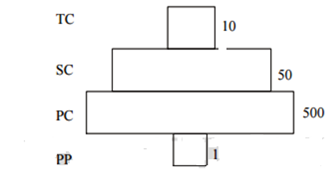 Multiple Choice Questions
Multiple Choice QuestionsWhich one of the following processes during decomposition is correctly described?
Fragmentation - Carried out by organisms such as earthworm
Humification - Leads to the accumulation of a dark coloured substance humus, which undergoes microbial action at a very fast rate
Catabolism - Last step in the decomposition under fully anaerobic condition
Catabolism - Last step in the decomposition under fully anaerobic condition
Match the name of the animal (Column I ) with one characteristic (Column II) and the phylum/class (Column III ) to which it belongs
|
Column I |
Column II |
Column III |
|
|
a |
Petromyzon |
Ectoparasite |
Cyclostomata |
|
|
Column I |
Column II |
Column III |
|
b |
Lchthyophis |
Terrestrial |
Reptilla |
|
|
Column I |
Column II |
Column III |
|
c |
Limulus |
Body covered by chitinous exoskeleton |
Pisces |
|
|
Column I |
Column II |
Column III |
|
c |
Limulus |
Body covered by chitinous exoskeleton |
Pisces |
In which of the following both pairs have correct combination?
| Gaseous nutrient cycle | Carbon and Nitrogen |
| Sedimentary nutrient cycle | Sulphur and Phosphorus |
| Gaseous nutrient cycle | Carbon and Sulphur |
| Sedimentary nutrient cycle | Nitrogen and Phosphorus |
| Gaseous nutrient cycle | Nitrogen and Sulphur |
| Sedimentary nutrient cycle | Carbon and Phosphorus |
| Gaseous nutrient cycle | Nitrogen and Sulphur |
| Sedimentary nutrient cycle | Carbon and Phosphorus |
A.
| Gaseous nutrient cycle | Carbon and Nitrogen |
| Sedimentary nutrient cycle | Sulphur and Phosphorus |
The biogeochemical cycles are of two types i.e., gaseous cycles, in which the reservoir for the nutrient elements is in the atmosphere (air) or hydrosphere(water). The four most abundant elements in the living systems, i.e. hydrogen, carbon, oxygen and nitrogen have predominantly gaseous cycles.
In sedimentary cycles, the reservoir for the nutrient elements is in sediments of the earth. Elements, such as phosphorus, sulphur, potassium and calcium have sedimentary cycles.
During ecological succession
the gradual and predictable change in species composition occurs in a given area.
the establishment of a new biotic community is very fast in its primary phase.
the number and types of animals remain constant.
the number and types of animals remain constant.
Most animals that in deep oceanic water are
primary consumers
secondary consumers
tertiary consumers
tertiary consumers
Deficiency symptoms of nitrogen and potassium are visible first in
senescent leaves
young leaves
roots
roots
Which one of the following is not a gaseous biogeochemical cycle in ecosystem?
Sulphur cycle
Phosphorus cycle
Nitrogen cycle
Nitrogen cycle
Identify the possible link A in the following food chain
Green plant  Insect
Insect  Frog
Frog  A
A  Eagle
Eagle
rabbit
wolf
cobra
cobra
Given below is an imaginary pyramid of numbers. What could be one of the possibilities about certain organisms at some of the different levels?
Level PC is insects and level SC is small insectivorous birds
Level PP is phytoplanktons in sea and Whale on top level TC
Level on PP is pipal trees and the level SC is sheep
Level on PP is pipal trees and the level SC is sheep
Which one of the following is not a functional unit of an ecosystem?
Energy flow
Decomposition
Productivity
Productivity
